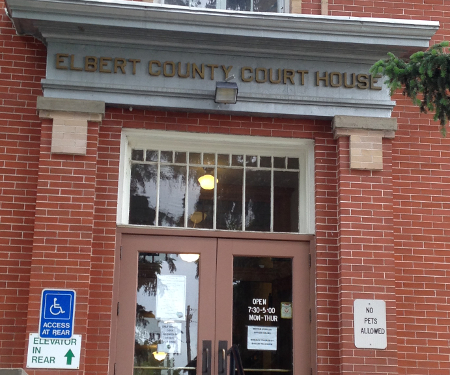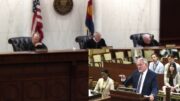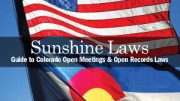By Jeffrey A. Roberts
CFOIC Executive Director
Real estate records, with few exceptions, are public in Colorado. Want to know the assessed value of your neighbor’s property? In most counties you can look it up online, no matter who your neighbor happens to be.
But in Elbert County, southeast of Denver, the assessment records of certain elected officials – including Assessor Billie Mills – are hidden from public view.
You can’t find them on the county’s website. And when the Colorado Freedom of Information Coalition showed up in person at the assessor’s office in Kiowa, we were told we couldn’t see the information without first getting permission from the elected official whose records have been flagged as confidential.
“It’s not a matter of hiding the value,” Mills told the CFOIC. “I know that’s what everyone is saying, but it’s a safety thing.”
 Mills said the county commission decided “many years ago” that Elbert’s elected officials should be allowed to request that their assessment records be hidden if they felt that public disclosure of the information might put them in danger.
Mills said the county commission decided “many years ago” that Elbert’s elected officials should be allowed to request that their assessment records be hidden if they felt that public disclosure of the information might put them in danger.
“The people in this county have a tendency to threaten us,” Mills said. “We get threats (against) our houses and our families.” Someone once threatened to bomb her home, she said.
When we first interviewed Mills a week ago Thursday, she said she would give the CFOIC permission to see the assessment records on her own property, “but if you asked for the treasurer’s (assessment), I wouldn’t give it to you” without checking with him first. Same for the county clerk and a county commissioner.
Assessment records, however, are supposed to be publicly available under the Colorado Open Records Act (CORA).
Although no state law requires county assessors to put the information on the Internet, media law attorney Michael Beylkin said “nothing in CORA allows public officials to withhold records that would disclose the tax assessment on a particular real estate property, including the name and address of the owner.”
“There is nothing I am aware of that allows an elected official to not have their assessment records available” to the public, added state property tax administrator JoAnn Groff.
Indeed, Elbert County finally made the assessment records available for inspection after the CFOIC submitted a formal CORA request letter. We picked up copies on Thursday, a week after we first asked for them in person and were told we needed permission from each elected official.
What changed in a week?
“The reason you were able to get the records that you requested was because you requested (them) through an open records request,” Mills said in an email.
As of Friday, the records still could not be found on the assessor’s website.
Gunnison County Assessor Kristy McFarland, president of the Colorado Assessors’ Association, said she hadn’t heard of any other assessor’s office in Colorado blocking the property assessment information of elected officials on county websites.
“I can’t think of any reason why that information should be hidden,” McFarland said. “People who work in government really need to make sure everything they do is transparent. I feel strongly about that.”
Colorado allows certain residents to request that some property information be kept confidential. Under the Address Confidentiality Program, a victim of domestic violence, sexual assault or stalking may apply for a substitute address to hide the location of an actual residence. State law also protects the online personal information of law-enforcement personnel.
Mills said several judges and people in law enforcement in Elbert County have had their information taken offline, including the elected county sheriff. As of a week ago Thursday, the elected officials with hidden assessments were Mills, Commissioner Robert Rowland, Treasurer Richard Pettitt, Clerk and Recorder Dallas Schroeder and former Commissioner Kurt Schlegel, who left office in January.
Former Commissioner John Shipper’s assessment information also wasn’t available, although his address was visible on the assessor’s website. After the CFOIC brought this to Mills’ attention, she said the Shipper example was a computer glitch. By that afternoon, his assessment data was on the website.
Mills also lifted confidentiality restrictions on former Commissioner Schlegel’s home as well as business property owned by Pettitt. “No, I don’t think it would” qualify for confidentiality, Mills said when the CFOIC asked why the treasurer’s business property assessment wasn’t available.
The assessment records of Commissioners Kelly Dore and Larry Ross are not hidden from view on the county’s website. Neither are the records of Coroner Mike Graeff and Surveyor Keith Westfall.
Rowland, who is chairman of the county commission, declined to answer questions about the county policy that Mills referenced or his reasons for keeping his own assessment information hidden on the county’s website. He referred questions to County Attorney Wade Gateley.
Gateley also wouldn’t comment on the policy mentioned by Mills, saying he hadn’t researched the issue.
Several days later, after the CFOIC submitted an open-records request for any documents related to such a policy, we were told in a letter “there are no records in the possession of Elbert County which are responsive to your request.”
Home addresses for Elbert County’s elected officials are in other public records such as voter registration databases and campaign finance filings on the Colorado secretary of state’s website. The public also can find their deeds and other property records on the county’s website.
Mills said the assessment cards often contain more detailed information about a house, including photos and floor plans – the type of information someone could use to see “where everything is in your home.”
“People have no clue how crazy (some) people are,” Mills said. “I know that people are trying to push that I’m hiding stuff and that we’re all doing it. No, it’s because we are threatened … They’re trying to make a thing out of this and it’s all due to safety.”
Changing the policy would be up to the commissioners, she said. “That wouldn’t be my decision to make.” The CFOIC also sought comment from Commissioners Dore and Ross, but they did not return phone calls.
Mills said any member of the public could ask to have photos and floor plans of their homes hidden from public view, but not the rest of their assessment records. So why wouldn’t the elected officials do the same? Why not post their assessments without the photos and floor plans?
“That was what the commissioners decided,” Mills said, “so that it would be totally confidential.”
Luis Toro, director of Colorado Ethics Watch and a CFOIC board member, questioned whether safety was the real reason for the hidden assessments.
“It strikes me as far more likely that the reason for hiding the assessments would be to cover up some sort of favorable treatment they may be getting from the assessor,” he said.
Follow the Colorado Freedom of Information Coalition on Twitter @CoFOIC. Like CFOIC’s Facebook page. Do you appreciate the information and resources provided by CFOIC? Please consider making a tax-deductible donation.




